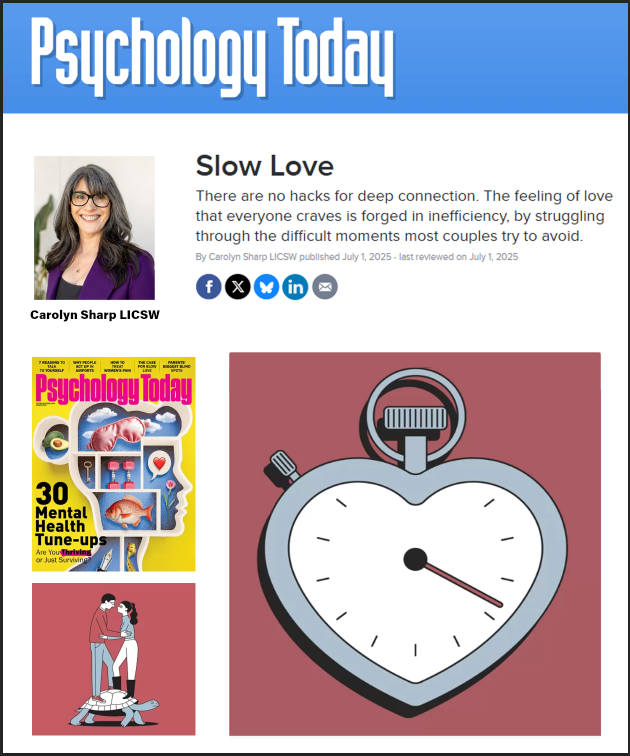Slow Love: The Psychology Today Feature
- Carolyn Sharp
- Jul 18, 2025
- 2 min read
Updated: Aug 4, 2025

There are no hacks for deep connection. The feeling of love that everyone craves is forged in inefficiency, by struggling through the difficult moments most couples try to avoid.
By Carolyn Sharp LICSW published for the paper edition of Psychology Today July 1, 2025 - last reviewed on July 1, 2025
Midway through 2025, we are well into the age of optimization, with a hack for every task and an endless feed of tips on doing more! faster! easier! An obsession with streamlining extends far beyond our calendars, kitchens, and boardrooms. It’s seeped into our most personal spaces—our relationships. We are conditioned to believe that efficiency is everything, that discomfort is a bug, not a feature of the human enterprise.
But when it comes to real love, discomfort is a sine qua non, and avoiding it does more harm than good. Discomfort forces couples to discover what their partner’s deepest emotional needs are, their very purpose in being in the relationship. That is how individuals come to feel supported, taken care of, and safe in the wider world.
As a therapist, I see a dynamic repeated again and again in my practice: Couples get discouraged that their relationship isn’t “working” as easily as it should. After scrolling through reel after reel of couples dancing in their kitchen, they want the fast fix for communication, the quick cure for disconnection. In demand are strategies to revamp the other person, the single phrase that obliterates all conflict, and the secret to intimacy without actually changing anything.
But love—real love—does not thrive in neat, optimized conditions. It grows in those hard moments of difference or difficulty when partners muster the courage to slow down, stay engaged with each other despite awkwardness, and choose connection over control. The drive to hack relationships shortcuts the opportunities that difficulties present for meaningful growth together.
The Efficiency Trap
The cultural emphasis on productivity teaches people to value certainty, predictability, and speed. Bullet-point plans and progress charts do wonders for project management, but they are wildly misaligned with the nature of human connection. I see too many couples who want to get back to their jobs, their kids, or their shows and not have to worry about their relationships. At the end of the day, they find themselves turned away from each other, on their phones, and perplexed by how they’ve grown so far apart.
To read more, grab your copy online or read online here:
Learn more about how Carolyn can support you here.




Comments